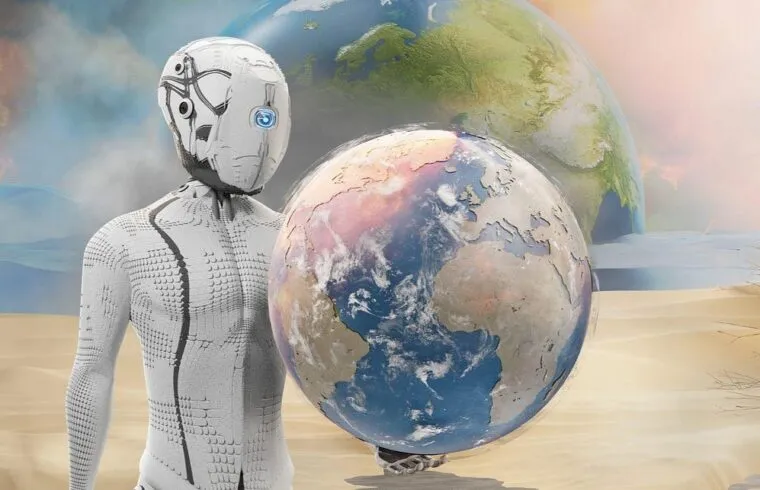The Dark Environmental Side of Artificial Intelligence
AI is transforming the world — from revolutionizing healthcare to automating business, from generating music to writing code. But while the tech world races toward faster, smarter machines, one critical question is being overlooked:
At what cost is this AI-driven future being built?
Behind the sleek apps and chatbots lies an unsettling truth: AI development is putting enormous pressure on our planet’s already fragile environment. Here’s how:
⚙️ 1. Development – At What Cost?
The race for AI dominance has led to massive infrastructure development, most of it hidden from public view. Training large AI models requires:
- Thousands of high-performance GPUs and TPUs.
- Vast data centers operating 24/7.
- Continuous training and retraining of models.
Companies like OpenAI, Google, Meta, and Amazon are investing billions — not just in software, but in energy-intensive hardware that demands constant power and cooling.
👉 Innovation is important, but innovation without sustainability is a ticking time bomb.
🔥 2. Massive Carbon Footprint
Training a single large AI model like GPT or DALL·E can emit as much carbon as five cars over their entire lifetime. A 2019 study from the University of Massachusetts Amherst found that training just one NLP model could emit over 626,000 pounds of CO₂ — equivalent to 60 round-trip flights from New York to London.
Now imagine that multiplied across:
- Dozens of tech companies
- Hundreds of AI models
- Millions of inference queries daily
🌡️ The result? AI is quietly becoming a major contributor to global carbon emissions.
⚡ 3. Electricity Consumption Breakdown
Data centers — the physical backbone of AI — consume a shocking 1–1.5% of global electricity, a number expected to double by 2030. AI-specific workloads are becoming the fastest-growing part of that consumption.
Breakdown:
- 🌐 Data Centers (AI-heavy workloads): 300–500 TWh annually
- 🧠 Model Training: One GPT-style model can consume 10–20 MWh
- ⚙️ Daily Use (Inference): AI tools like ChatGPT are queried billions of times per day — each interaction consuming micro-units of energy that rapidly add up
Many centers still rely on coal and natural gas, particularly in regions like India, China, and parts of the U.S. This undermines efforts toward climate goals and renewable adoption.
🧯 4. E-Waste, Water Use & Other Environmental Repercussions
🗑️ E-Waste Explosion
AI demands cutting-edge hardware — from GPUs to servers — which become obsolete quickly. The average lifespan of AI hardware is under 3 years. This contributes to the 50 million+ tons of e-waste generated globally each year, much of which ends up in landfills in Africa and Asia, leaking toxins into soil and water.
💧 Water Resources
Cooling AI data centers requires vast amounts of water. For instance, Google used over 5 billion gallons of water in 2022 — much of it to cool servers used in AI computation. This occurs even in drought-prone regions, raising ethical and environmental concerns.
🐾 Other Environmental Harms
- Rare Earth Mining: AI hardware depends on rare earth elements like lithium, cobalt, and nickel — leading to deforestation, habitat destruction, and toxic waste.
- Noise Pollution: Industrial-scale GPU farms and server centers generate constant noise and heat, affecting nearby ecosystems.
🛑 So… Is AI Killing Our Planet?
Not yet — but it could, if we don’t act responsibly.
The same intelligence that builds AI can be used to make AI greener:
✅ Shift to renewable energy-powered data centers
✅ Use energy-efficient algorithms
✅ Regulate training limits on non-essential models
✅ Design hardware built for longevity
✅ Introduce global standards for AI sustainability
🌱 Conclusion: A Smarter Planet or a Hotter One?
AI holds enormous promise. It could help solve climate change — or accelerate it.
The choice is ours: do we build intelligence that mimics the mind, or intelligence that also protects the Earth?
Because in the end, no amount of artificial intelligence will matter on a dead planet.
#AIClimateCrisis #GreenTech #SustainableAI #CarbonFootprint #DataCenters #Ewaste #SaveThePlanet
#AIvsEarth #GreenAI #CarbonCost #DataCenterPollution #SustainableTech #ClimateCrisis





